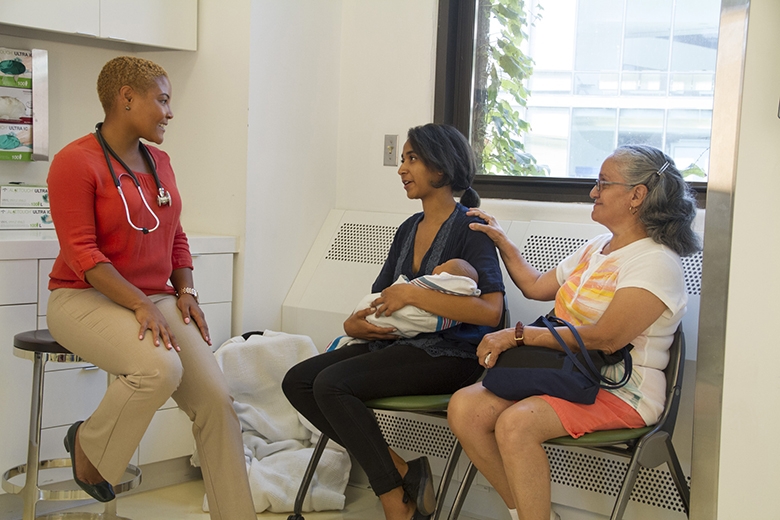

Overview
11 Trauma-Informed Care virtual patient cases demonstrate the effects of trauma on physical and mental health and ways that clinicians can provide appropriate care to trauma survivors.
Trauma-Informed Care provides a training tool for a broad range of healthcare providers and their staff to learn about the prevalence and impact of trauma and how to integrate the principles of trauma-informed care into clinical practice. By understanding the behavioral, neurological, and health effects of trauma and learning specific communication skills, clinicians can improve their relationships with patients, better engage patients in all aspects of their care, and potentially reduce the risk of their own professional stress and burnout.
Aquifer Trauma-Informed Care is part of Aquifer’s Clinical Excellence Case Set, which includes 52 cases covering Palliative Care, Trauma Informed Care, Diagnostic Excellence, High Value Care, Social Determinants of Health, and telemedicine.
70% of adults in the US have experienced some type of traumatic event at least once in their lives. That’s 223.4 million people.
– The National Council for Behavioral Health
What is Trauma-Informed Care?
Trauma-informed care recognizes the signs, symptoms, and risks of trauma to better support the health needs of patients who have experienced traumatic events. It is an outgrowth of abundant and definitive research findings, such as the Adverse Childhood Experiences (ACE) Study, which demonstrates that exposure to traumatic events is highly prevalent in our society.
Recognizing this relationship between adversity, health, and well-being, Trauma-Informed Care takes the universal precaution approach, which is to assume everyone has experienced some form of trauma, which is essential, given that most patients do not disclose their history of trauma, and likely may not even be aware of the impact it has had on them.
- Part of Aquifer’s Clinical Excellence Case Set, included with Curricular Partner subscriptions and available by subscription to Limited Subscribers
- Cases focus on the impact of trauma and how healthcare practitioners can provide appropriate care for diverse populations
- Ready-made cases to support self-directed learning, appropriate to supplement pre-clinical or clinical learning
- Cases take approximately 15-20 minutes to complete.
- Appropriate to support pre-clinical or clinical learning.
- Can be combined with other cases in a custom course to meet the needs of your specific curriculum.
Virtual patient case scenarios address a range of core competencies and critical learning objectives, including the prevalence and health effects of trauma, the principles of trauma-informed care, the neurobiology of trauma, clinical management of persons who have experienced traumatic events, and interprofessional collaboration methods for working with trauma-affected patients. The types of patients cared for in the cases span the age spectrum and are seen primarily in the outpatient setting or in the emergency department.
The cases illustrate how trauma-informed care can improve patient-provider rapport, increase patient engagement in preventive care, and facilitate integrated, patient-centered treatment plans.
All Clinical Excellence Case Sets, including Aquifer Trauma-Informed Care, now include:
- Principles module: covers key definitions, epidemiology, explanations of key principles and why they are important for patient care, and a harm statement that makes it explicit what harm can come to the patient if the principle is not incorporated into practice.
- Application Cases: Brief, realistic case scenarios that focus on one area of a patient encounter, and are centered around asking students to make important clinical decisions. Content models evidence-based best practices and communication strategies, exploring the real-world impacts on care and potential harm. At the end of each case, a reflection question asks the students to consider key takeaways, implications for their future practice, or personal wellness. Each application case also includes self-assessment questions that extend the learning to other scenarios.
Aquifer Trauma-Informed Care is designed for any level student in a medical school or health professions program. The course is an ideal assignment for students to complete as preparation for clinical experiences that include telemedicine. Cases also serve as valuable reference material for students to return to as they need to refresh their knowledge during clinical rotations.
Programs with a current Aquifer subscription will also have faculty and administrator access to an accompanying educator guide. Subscribers will also be able to view student progress reporting and combine the new cases with other Aquifer content in a custom course.
Trauma-Informed Care 01: Principles of trauma-informed care
Trauma-Informed Care 02: 45-year-old woman with diabetes experiencing stress
Trauma-Informed Care 03: 33-year-old female with insomnia
Trauma-Informed Care 04: 50-year-old female with stress and noncardiac chest pain
Trauma-Informed Care 05: 8-year-old male with asthma
Trauma-Informed Care 06: 48-year-old female coping with HIV
Trauma-Informed Care 07: 58-year-old female veteran with chronic pain
Trauma-Informed Care 08: 58-year-old male with gastrointestinal symptoms
Trauma-Informed Care 09: A rape exam in the emergency department
Trauma-Informed Care 10: Physician with a trauma history
Trauma-Informed Care 11: 78-year old male wellness visit
Trauma-Informed Care 12: 28-year-old pregnant woman with a history of witnessing violence
